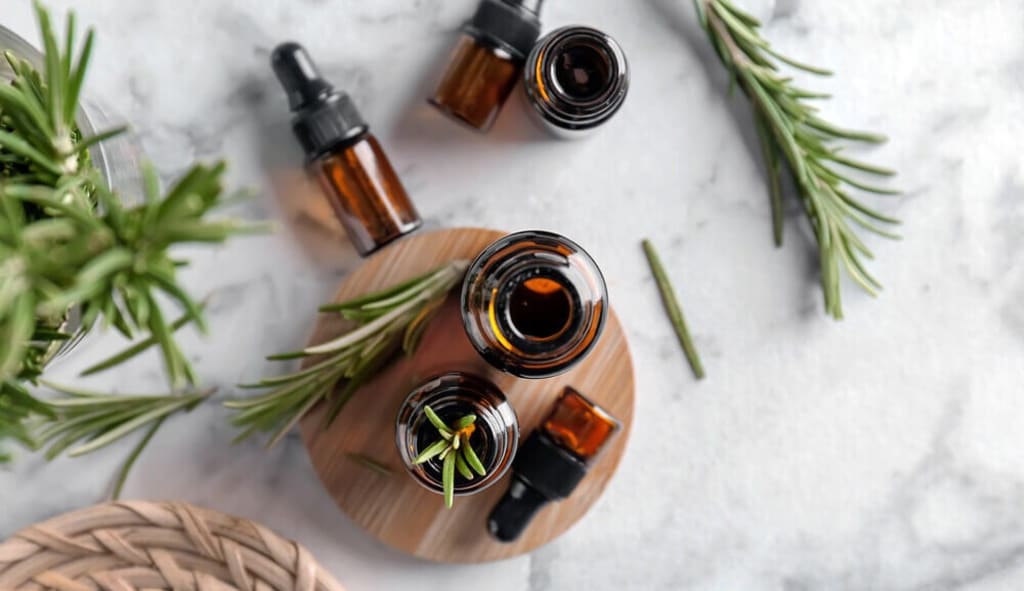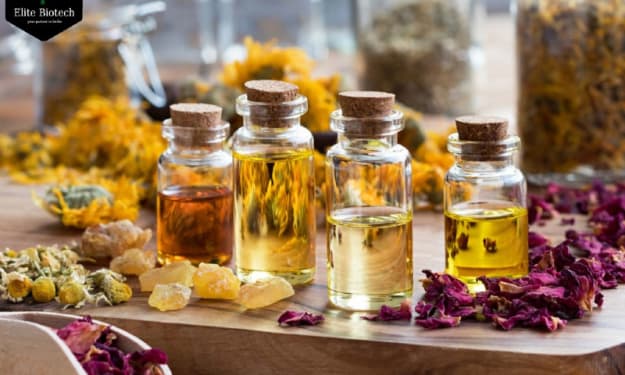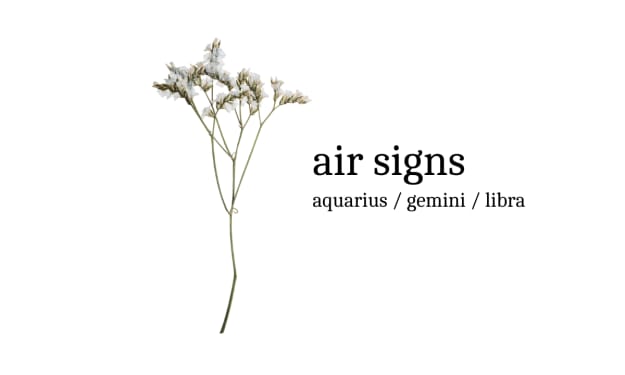
Rosemary (Rosmarinus officinalis), also known as compass plant, is a bushy evergreen shrub with small blue flowers and rather stiff branches covered with highly sweet, needle-suchlike foliage. Native to the Mediterranean region, this versatile plant is familiar to cooks, gardeners, and herbalists around the world. The genus Rosmarinus contains two to five species, depending on which botanists you ask. Fortunately, we don’t need to get into the debate about species since Rosmarinus officinalis is the only one generally used for essential oil products and cited in aromatherapy references.
There are two kinds of Rosmarinus officinalis, one being a standing plant and the other a lovely prostrate type. Numerous herbalists I know use the two varieties interchangeably for making traditional herbal preparations. Within each type of rosemary, whether erect or prostrate, there are several cultivars, and these vary in terms of their cold hardiness. In general, still, rosemary is a kindly tender factory that won’t survive formerly temperatures dip into the teens. Consider growing it in pots if you live in a cold area.
Rosemary Essential Oil Civilization
Utmost of the Rosemary Essential Oil available in marketable requests come from farmers in France, Spain, Dalmatia, Tunisia, and Corsica and the oils produced in each region have some notable differences, as you’ll see. It'll help you in buying Rosemary Essential Oil to bear in mind that there are several “ chemotypes” of Rosmarinus officinalis. This gets a little specialized but it’s really useful so bear with me. When a factory has different chemotypes, it means that members of this genus and species can differ so significantly in their chemical composition, frequently depending on where they were grown, that they will have kindly different properties. For illustration, the Rosemary Essential Oil that comes from Morocco and Tunisia is generally a cineole chemotype (Rosmarinus officinalis CT cineole).
Companies that vend essential oils frequently don’t specify the chemotype of their product, when applicable, but the cineol chemotype ( also known as the “ cineole chemotype) is what’s most constantly being offered and when you buy “ Rosemary Essential Oil” that’s what you’re generally going to get, especially if that oil comes from Morocco or Tunisia. Rosemary Essential Oil that comes from Spain or France is frequently of the Camphor chemotype, so-called because it has further of the constituent called camphor. Spain also produces a lot of alpha-pinene chemotypes. I don’t prefer the camphor chemotype for general use because camphor is a potentially neurotoxic element.
The final type of Rosemary Essential Oil that I want to mention is the Verbenone chemotype; our selection comes from Corsica. This chemotype frequently contains lower cineole and occasionally lower camphor than other chemotypes, leading some aromatherapists to describe it as gentler in its conduct than other types of Rosemary Essential Oil. According to Peter Holmes (A Clinical Companion to Essential Oil Therapeutics, 2016, pg. 314-315), Rosemary Verbenone essential canvas is the least stimulating and warming of the major types of Rosemary essential oil. Rosemary Verbenone is more frequently used by professional aromatherapists than by non-professional druggies and this may simply be because professional druggies are more familiar with the conception of chemotypes. There are other chemotypes of Rosemary Essential Oil that I haven’t mentioned but these are the bones that I've seen most constantly in marketable requests.
Rosemary History of Use & Folklore
The name “ rosemary” comes from the Latin “ Rosmarinus” which means “ rose of the ocean”. It’s one of the first shops that we know to have been used for drugs and it’s one of the sauces that was largely regarded as a preventative and remedy for the pest – so important that the price of it during that time went through the roof, with an armful going about half to three-quarters of an average day’s wage during the plague times of the Medieval Period.
Rosemary was believed in once periods to attract good spirits and brownies and to drive down bad spirits and demons. There’s a long-standing association between rosemary and memory, reflected in the old byword “ Rosemary is for remembrance”. The Egyptians placed rosemary shoots in the sepultures of pharos to help them recall their former life when they arrived in the underworld after death. Rosemary was sacred to the Greeks and Romans who considered it to be symbolic of fidelity, remembrance, and learning.
In modern times, inhaled Rosemary Essential Oil has reportedly been shown to improve scholars’ recall of studied material during tests. However, remember that you still have to study, however! Rosemary was also one of the main constituents in Queen of Hungary Water, which was credited with transubstantiating the extremely ill, If you want to give this a pass. Firstly, this “ water” was said to be folk alcohol but ultimately it came to incense and its enduring fashion ability is reflected in the fact that multitudinous companies moment manufacture versions of it.
Rosemary Essential Oil Extraction
Rosemary is generally hand-gathered for essential oil products while it’s in flower in mid-summer. The essential oil can also be distilled from either fresh or dried leaves and flowers. One hundred pounds of unfolding tops yields about eight ounces of essential oil and this is the stylish canvas. Cheaper, and less desirable, selections of Rosemary Essential Oil are produced from the distillation of factory material that includes lower leaves and stems.
Physical and Sweet Properties Rosemary Essential Oil is tintless to pale unheroic, fairly thin liquid with a warm, herbaceous scent graced with woody and balsamic undertones. Selections high in camphor will have a distinctive, piercing camphorous scent.
What Aromatherapists Have Said About Rosemary Essential Oil
Aromatherapists have made some claims for the mending parcels of Rosemary Essential Oil and it has been described in aromatherapy literature as
• easing pain
• stimulating the central nervous system
• enhancing physical performance
• dwindling muscle spasm
• stimulating circulation
• dwindling inflammation
• perfecting memory and enhancing learning.
According to the reports of some aromatherapists, Rosemary Essential Oil has been observed to increase blood pressure when used in advanced amounts (3 drops or further) and to lower blood pressure when used in low amounts. I haven't seen it drop blood pressure but I've seen rises in blood pressure following application or inhalation of Rosemary Essential Canvas and I believe that it's stylish avoided by persons for whom hypertension is an issue.
Based on its claimed actions, as noted over, aromatherapists have used Rosemary Essential Oil in cases of
• routine muscular aches and pains
• painful joints
• respiratory complaints
• exhaustion
It has also been extensively used as a study aid and has been recommended by some aromatherapists as being helpful for people with early stages of cognitive loss.
Subtle Effects Subtle effects relate to the claimed effects that essential oils exert on the mortal energy fields, subtle bodies, and spirit. Not everyone accepts the idea that there's such a thing as “ subtle effects” but those who do consider this aspect of aromatherapy veritably important. My main source for information on the reported subtle goods of essential oils is traditional I especially look at the work of those ultramodern interpreters who have combined classical Chinese Medicine and aromatherapy, similar to Gabriel Mojay and others. Gabriel Mojay describes Rosemary Essential Oil as “ one of the most precious and amping of essences” and describes it as excellent alcohol for the body’s yang energy and thus good for internal and physical debility/ malaise.
From the Chinese Medicine perspective, symptoms like agitation, restlessness, insomnia, heart palpitations, tachycardia, hypertension, and sweats are signs of too important yang energy and so you would not want to use Rosemary Essential Oil with persons passing those symptoms. Although some aromatherapists believe that Rosemary Essential Oil is helpful for memory loss in elders it may not be a good choice for those whose memory decline is accompanied by agitation and restlessness. The same may be said of using Rosemary Essential Oil with over-active and distractible adults and children. I’m apprehensive that a lot of people have tried to use Rosemary Essential Canvas to help those who have literacy problems due to distractibility. Still, I’m also apprehensive of cases in which this approach seems to have made effects worse and I suspect that this is because Rosemary Essential canvas may aggravate hyperactivity, which is a point that frequently occurs with distractibility.
As a Fire element factory, rosemary condiment and essential canvas have been said to act on the spirit of the heart which is appertained to as the Shen in Chinese Medicine. The Shen is said to give the yang energy that enlivens the psyche and brings warmth to our personality, clarity to our internal processes, and joy to our life. The Shen is veritably sensitive and trauma of a physical or psychic nature can beget it to flee from its place in the heart, taking these rates with it. When you see someone, who lacks refulgence and seems to have a lack of warmth and is distracted or fuzzy in their thinking, exhausted, mildly restless but not agitated – also you might suppose of adding small amounts of a veritably good Rosemary Essential Oil to the blend you make for them. Looking at Rosemary Essential Canvas from the perspective of its subtle goods highlights the significance of using it in the proper amount and the right situations. However, hyper, and has other heat signs ( sweating, If you use it on someone who's formerly nervous.), also this perspective suggests that they won't be helped by it and may indeed reply poorly to it. In anyone, indeed good Rosemary Essential Oil can reportedly be too stimulating if used redundant and when I’m using Rosemary Essential Oil I get the best results at an affordable cost.
Elitebiotech Rosemary Essential Oil has been described as non-irritating and non-sensitizing when used in proper dilutions. It's generally not recommended for pregnant women, asthmatics, epileptics, or in cases of hypertension ( high blood pressure). Don’t use it in the vicinity of babies and children under 5. Some aromatherapists have said that you shouldn't use it when taking homeopathic remedies, as it may negate the effects of those remedies. Use in small amounts since it can be stimulating. Buy the best quality you possibly can.
About the Creator
Ria Kr
We maintain absolute integrity, honesty, transparency and fair-play in all our official dealings and strive to maintain high standards of morality.






Comments
There are no comments for this story
Be the first to respond and start the conversation.